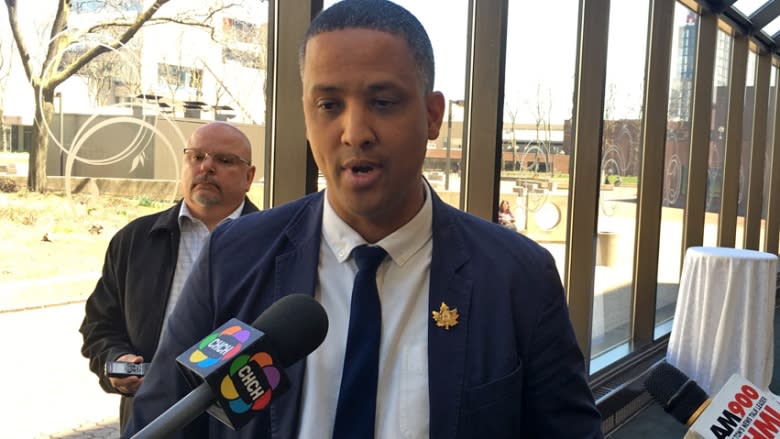Tribunal rejects black councillor's claim Hamilton police stop was racial profiling
The officer accused of conducting an improper street check on city councillor Matthew Green has been found not guilty.
Const. Andrew Pfeifer was charged with discreditable conduct under the Police Services Act after he stopped in his cruiser to ask Hamilton's first black city councillor some questions in 2016.
The outcome of the hearing into what Green alleged was racial profiling left police officers applauding and members of the black community shouting "shame!"
The incident happened amid broader controversy over carding, and after the decision Green and his supporters criticized the fairness of the hearing. But in the hearing officer's decision, it was Green's credibility that was at issue.
During the hearing, Green said he was clearly just on his phone and waiting for the bus, and that he felt racially profiled and "psychologically detained" by Pfeifer's questioning.
Pfeifer said it was a cold and windy day, and Green was standing in an unusual spot, so he wanted to see if he was OK. He also testified that Green was also in an area with three lodging homes for people with mental health issues.
After a five-day hearing, hearing officer Terence Kelly sided with Pfeifer.
"In my view, Const. Pfeifer's … concerns were reasonable and not the result of hyper sensitivity in regards to Mr. Green," Kelly said in his ruling.
Kelly said he found witness accounts for Green to be unreliable — especially Green's account.
"I lack the necessary confidence in Mr. Green's credibility to accept his evidence that he was psychologically detained," said Kelly, a retired York Region deputy police chief.
Green says he stands by his account, but he wasn't optimistic he'd get a fair shake.
"I'm unsurprised with the outcome," said Green, who has also filed a human rights tribunal complaint.
"I think it was pretty clear within the first five minutes of the police service hearing that this was not the proper forum to discuss the factors around racial bias and profiling."
"There's a reasonable presumption of bias in how it was handled and I think the transcripts will bear that out."
Pfeifer's lawyer, Bernard Cummins, disagreed.
"There was nothing wrong with the proceeding, nothing wrong with the hearing," he said. It was "the very simple task who was telling the truth, and it became very clear who was telling the truth right from the get go."
"What was on trial was Mr. Green's insufferable ego for five days, and there was a huge emotional and financial cost."
The hearing came after an incident on April 26, 2016.
Green had just visited a constituent and was catching the bus at Stinson Street and Victoria Avenue South. He waited under a bridge, he said, because it was cold and windy, and he was dressed lightly for 4 C weather.
Pfeifer stopped his cruiser in front of green and asked what he was doing, not realizing Green was a city councillor. Green says he told him he was waiting for the bus.
But the two sides disagree about the nature of that conversation, which lasted about a minute. Green says he felt targeted, and that Pfeifer clearly had the power in the situation. Pfeifer says it was Green who was confrontational.
Those opposite viewpoints played out at the hearing Thursday too. About 100 people attended. Half the room was off-duty police officers who cheered when Kelly read the verdict. The other half was Green supporters who yelled "Shame!"
Green's case has always had broader implications. It came as anti-racism advocates were pushing for fairer rules around when an officer can log someone's ID and whereabouts in a database. Green even hosted a town hall on the subject in 2015.
The province passed new rules in January 2017, although NDP leader Andrea Horwath — also Hamilton Centre MPP — said this month that they didn't go far enough.
Hamilton Police Service has also drastically reduced its use of carding, although numbers from the last decade show officers disproportionately targeted people of colour.
Clint Twolan, president of the Hamilton Police Association, alluded to Pfeifer being caught in the crossfire of that debate.
"He's done nothing wrong and that came out in the tribunal," Twolan said. "He's certainly taken a huge impact to his personal life having to deal with this, so I'm just going to be there to encourage him to move on."
Evelyn Myrie, president of the African Canadian Caribbean Association, told Twolan the finding inspires "further mistrust."
"What do I tell my members when I go back and say the case we thought was a good one certainly fell apart in terms of the judgment?"
Chief Eric Girt issued a brief statement Thursday.
"The hearing officer has made his decision based on the evidence presented and we respect the process," he said. "The decision speaks for itself."




